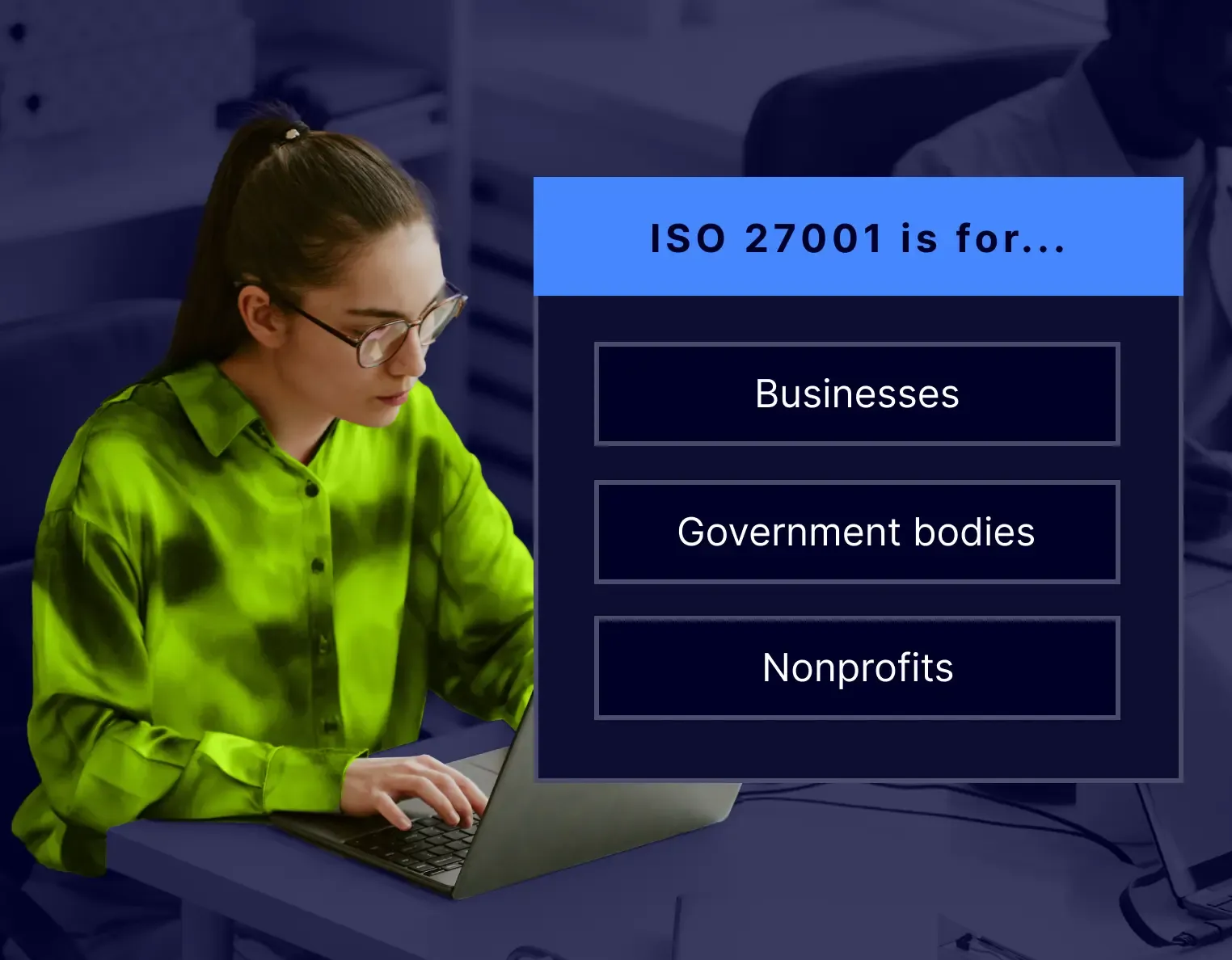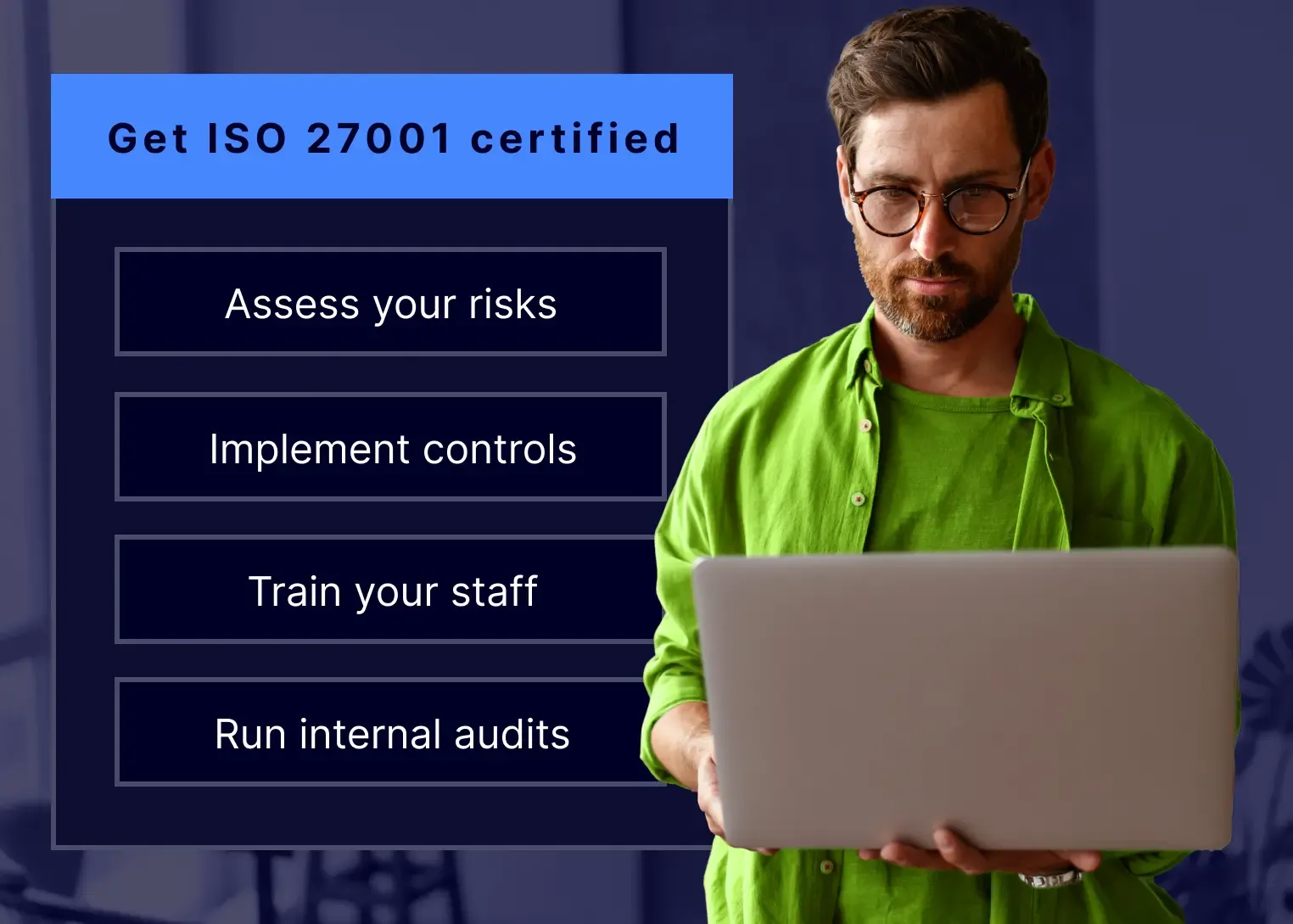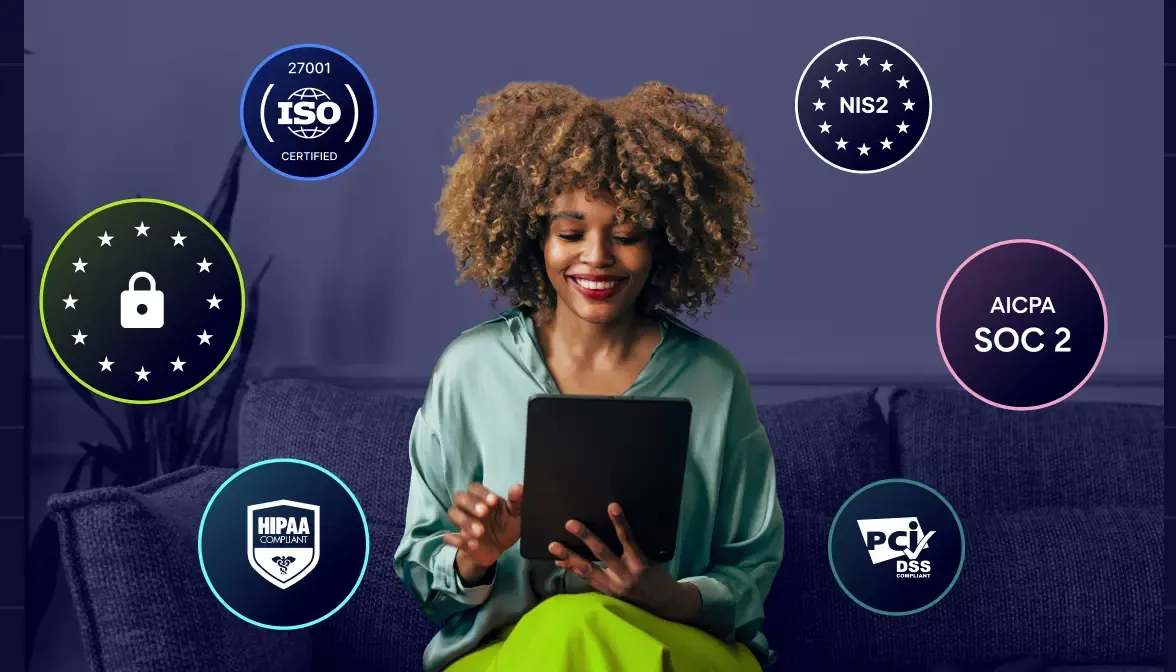ISO 27001 solutions
Achieving ISO 27001 compliance involves much more than technology. It requires a combination of risk management, policies and procedures, staff training, and an organization-wide commitment to information security. NordLayer helps support this process by providing secure network access, encryption, and advanced controls that align with specific ISO 27001 requirements.
Join 15,000+ companies protecting their teams & data with NordLayer
SOC 2 compliant
ISO 27001 compliant
PCI-DSS compliant
HIPAA compliant
Platform-driven compliance
Don’t get caught out by compliance
The toggle-ready NordLayer platform brings access controls, logs, and policies into one platform - helping you stay aligned and catch issues before they become problems.
THE REQUIREMENTS
ISO 27001 controls & requirements
The ISO 27001 controls (also known as safeguards) are the practices to be implemented to reduce risks to acceptable levels. Controls can be technical, organizational, legal, physical, human, etc. To ensure compliance, companies must list all security controls in a document called the Statement of Applicability with justification for their inclusion and whether the controls are implemented or not.
There are 93 Annex A controls divided into 4 different categories. The ISO 27001 Annex A Controls are listed below.
ISO 27001 Requirements:
Establishing the scope of the ISMS
ISO 27001 leadership
Risk management & clear objectives
Continuous resource allocation & employee recruitment
Creating an operational plan to secure assets
Measuring ISO 27001 performance
Making improvements and dealing with non-compliance
FRAMEWORK
ISO 27001 Annex A Controls:
Focus on building a strong Information Security Management System (ISMS) through governance, risk management, and clear security policies. Security becomes part of everyday operations and decision-making across the organization.
Address the human side of information security through training, awareness, and behavior management. Employees and stakeholders learn their responsibilities and follow best practices to reduce risks caused by human error.
Protect infrastructure, facilities, and physical assets from unauthorized access, theft, and environmental damage. Help secure vital resources and minimize physical security threats.
Secure digital systems, networks, and data against cyber threats. Support the confidentiality, integrity, and availability of information through tools like encryption, access controls, and monitoring systems.
CERTIFICATION PROCESS
Key steps towards ISO 27001 compliance
Achieving ISO 27001 compliance involves a structured process with precise steps. Each stage strengthens your information security posture.
Assess risks
Consider vulnerabilities and threats impacting data.
Set ISMS goals
Define a tailored security management system and objectives.
Implement controls
Apply technical and organizational controls for risk mitigation.
Train & review
Ensure employees understand policies; conduct regular reviews.
Review
Conduct internal audits to identify and fix gaps.
Audit & certify
Complete an external audit to confirm ISO 27001 compliance.
Maintain compliance
Perform regular reviews and updates to stay compliant.
WHY NORDLAYER
How NordLayer supports your ISO 27001 compliance goals
NordLayer’s business VPN and network security features support your ISO 27001-compliance efforts by helping you strengthen data security, control access, and improve visibility across your IT environment.
Control access to sensitive information
Limit access to your network and data to only authorized users and trusted devices. NordLayer helps you build strong, ISO 27001-compliant access controls in line with Annex A.8 Technological controls.
- Cloud Firewall – Segment your network and manage access based on user roles and responsibilities.
- Device Posture Security – Allow only secure, policy-compliant devices to connect.
- Site-to-Site & Cloud LAN – Provide safe, encrypted connections to remote networks and resources.
Secure remote & hybrid work environments
ISO 27001 requires that remote access to company resources is secure and controlled. NordLayer provides encrypted, reliable access tailored for today’s hybrid and remote work models.
- Secure Remote Access – Establish encrypted VPN connections across devices, users, locations, and hybrid networks.
- Device Trust & Posture Check – Block access from devices that don’t meet your security requirements.
- Multi-Factor Authentication – Add an extra layer of identity verification before granting access to sensitive resources or specific parts of the network.
Protect data in cloud environments
ISO 27001 Annex A.8 Technological controls include the need to secure cloud usage. NordLayer helps you meet this requirement by protecting your connections to cloud service providers like AWS, Azure, and Google Cloud, cloud-based work tools like CRM, SCIM, or CMS platforms.
- Cloud and SaaS apps security – Safeguard data across cloud platforms and business applications.
- DNS Filtering – Block access to malicious or high-risk websites before threats reach your network.
- Network segmentation – Access rights distribution based on roles and responsibilities.
Detect & respond to cyber threats
ISO 27001 Annex A.8 Technological controls focus on proactive threat detection and response. NordLayer helps reduce risk by identifying and blocking threats before they cause harm.
- Download Protection – Automatically delete malicious files at the point of download.
- Web Protection – Prevent users from accessing known dangerous or suspicious websites.
- Device Posture Security – Automatically disconnect users if their device fails to meet security standards.
Encrypt traffic to protect data in transit
ISO 27001 Annex A.8.24 Use of cryptography requires encryption for data in transit. NordLayer meets this standard using advanced, quantum-safe encryption to keep your information secure from interception.
- AES-256 and ChaCha20 Encryption – Industry-leading encryption algorithms to safeguard data in transit.
- Secure VPN Protocols – Use OpenVPN or NordLynx for strong protection with optimal performance.
- Always-On VPN – Enforce continuous VPN use to eliminate unprotected traffic and ensure full compliance.
Gain visibility & audit user activity
Support ISO 27001 Annex A.8 requirements with NordLayer through enhanced visibility and auditing of user and administrative activity.
- Activity & Device Monitoring – See who accessed the network, when, and from which device.
- Admin & Operator Logs – Track all changes made in the Control Panel, including policy and user updates.
- Log Access Protection – Logs are restricted to authorized admins and protected with multi-factor authentication.
We can help you meet ISO 27001 compliance
NordLayer’s information security practices are ISO 27001 certified. Our solutions are designed to help organizations address specific technical requirements—like secure access and encryption—as part of their broader compliance efforts.
OUR INSIGHTS
ISO 27001 Resources
ARE YOU COMPLIANT?
Secure your compliance journey with NordLayer
Achieve regulatory compliance requirements and protect your sensitive business data with NordLayer. Our systems are ISO 27001 certified, pass SOC 2 Type 2 audits, and align with HIPAA Security Rules. We use AES-256 and ChaCha20 encryption to ensure data security. Let us guide you through your compliance journey.
ADDITIONAL INFO
Frequently Asked Questions
ISO/IEC 27001 is a globally recognized standard for information security management, jointly published by ISO and IEC. It defines an ISMS framework for protecting data through risk management, policies, and security controls.
ISO 27001 safeguards against data breaches and cyber-attacks, showcasing a business’s dedication to information security. Certification builds trust with stakeholders and customers, ensuring compliance with global security standards and reducing repeat audits.
ISO 27001 emphasizes confidentiality, integrity, and availability. Confidentiality limits data access, integrity ensures data accuracy, and availability makes information accessible to authorized users, protecting against unauthorized changes or losses.
ISO 27001 does not explicitly require a VPN. The standard is non-prescriptive, meaning it tells you what security objectives to achieve, not how to achieve them.
However, a business VPN can be an efficient way for organizations with remote workers to support applicable security controls outlined in the standard’s Annex A. Here’s why:
- Access Control (Annex A.5): A VPN acts as a secure gatekeeper. It can support access control policies (A.5.15) by helping ensure only authenticated and authorized users can connect to private resources It can also help protect authentication information (A.5.17) and support secure authentication (A.8.5) where relevant.
- Cryptographic Controls (Annex A.8): A core function of a VPN is encryption. This supports the Use of Cryptography (A.8.24) by protecting the confidentiality and integrity of your data in transit over untrusted networks.
- Network Security (Annex A.8): A VPN can help you apply controls for Security of Network Services (A.8.21) and Segregation of Networks (A.8.22) by creating encrypted tunnels for communications and supporting segmentation patterns. This can also support remote working (A.6.7) when employees access resources from outside the office.
Organizations that want to earn an ISO 27001 certification are required to maintain an Information Security Management System (ISMS) that covers all aspects of the standard. After that, they can request a full audit from a certification body.
SOC 2 serves primarily North American service providers, while ISO 27001 is global. SOC 2 allows custom scope based on business needs, but ISO 27001 requires a full ISMS with risk assessments. SOC 2 has no certification, only attestation, unlike ISO's formal certification.
Certification costs vary by organization size and complexity. Costs include audit fees, compliance preparation, and maintaining the ISMS, making ISO 27001 achievable for businesses of different sizes and needs.
No, ISO 27001 is not legally mandatory in the USA. However, many organizations choose to pursue certification to strengthen their security posture, meet client or partner requirements, and stay competitive, especially in industries handling sensitive data or operating internationally.
Yes. NordLayer’s Information Security Management System (ISMS) is certified to ISO/IEC 27001:2022. This gives you independent, third-party validation that NordLayer’s security management practices meet the global standard for protecting data. This certification shows our commitment to a systematic, risk-based approach to information security, and our features are designed to help your organization meet its own ISO 27001 compliance requirements.


